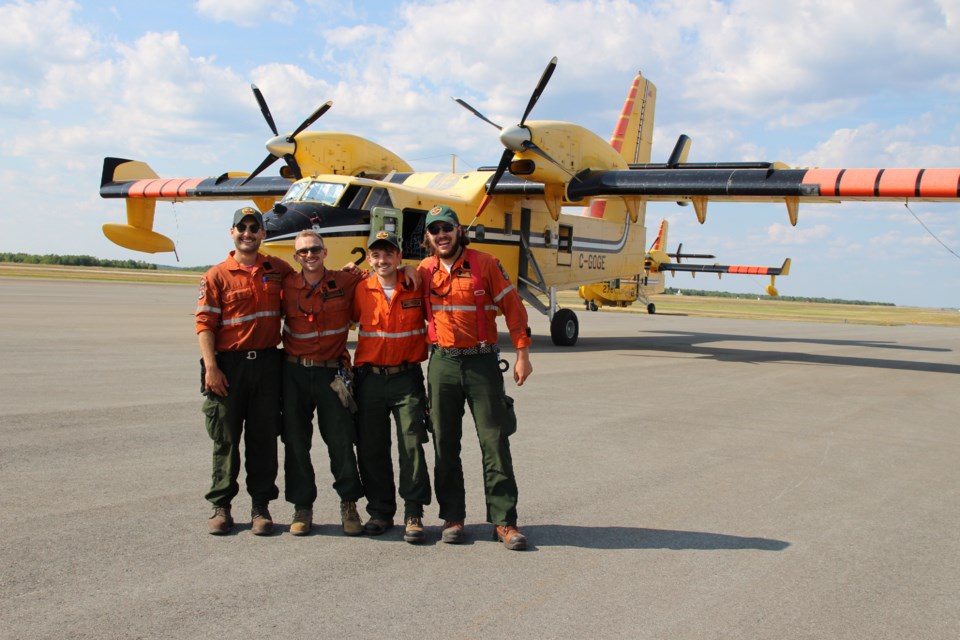SIOUX LOOKOUT — A member of the union representing the province's wildland firefighters is criticizing a regional MPP for a response in the legislature this week.
During a discussion in Queen's Park, MPPs were discussing workplace safety regulations when Thunder Bay–Superior North NDP MPP Lise Vaugeois raised concerns that wildland resource technicians have brought forward over previous months that they don't receive the same health benefits, equipment and wages as municipal firefighters.
That prompted a response by Thunder Bay–Atikokan PC MPP Kevin Holland, who mentioned his experience as a long-serving volunteer firefighters in Conmee, where he also spent decades as mayor.
“We advocated with previous governments for a long time to bring in legislation that provided this protection to our firefighters. We have. You can sit there and wave your arms all you want. But we have brought in, this government is the one that has brought in, legislation recognizing the importance of protecting our firefighters,” Holland said in the legislature.
The province has plans to spend $20.5 million to modernize forest fire efforts, which will be put toward recruitment and retention, new aerial fire suppression technologies, supporting Indigenous wildland fire management, and investing in risk assessment and mental health programs.
But Noah Freedman, the vice president of OPSEU Local 703, said Holland's comments entirely missed the point.
“He doesn't understand that that legislation does not help us at all, which is why we've been screaming from the rooftops. And thankfully, people like [Vaugeois] have been fighting for us saying no, they need to be reclassified so that they can get the benefits that you're talking about,” Freedman said in an interview.
“It's a perfect example of the misinformation that the Ford government and [Natural Resources and Forestry Minister Graydon] Smith have been putting out there and trying to convince the people that we are taking care of when we're not.”
Freedman would like to see the Ford government reclassify those with resource technician job titles to forest firefighters, which Freedman claims “can be done with a stroke of a pen.”
“It's really simple actually. Minister Smith especially constantly tries to say things like, “Oh, it's about collective bargaining. It's in our collective agreement.” It has nothing to do with that. The ministry has even recently reclassified people on a dime. It's something they can do for us today,” said Freedman.
“Reclassifying us would simply allow us to be recognized as firefighters which would help us get the presumptive health care that regular firefighters get. Like if we get cancer down the road, nobody's helping us. If we were recognized as firefighters that might change. All of the issues that we have can be fixed with the stroke of a pen if the government will just agree to reclassify us.”
Freedman said resource technicians have zero health coverage other than OHIP, and that WISB insurance claims do not cover smoke inhalation. The collective agreement does not have presumptive health care written into it in case they get cancer down the line, he added.
“There is a form that you can fill out for unexpected toxic substance exposure. They try to pass that off as, helping us, but it doesn't. I mean, clearly, everybody across Canada understands that we, every day out there, are in constant interaction with smoke and toxins. I think something that people don't understand because they've tried so hard to make sure that people don't, is the same chemicals that are in a cigarette are in naturally occurring forest fires, whether that's in wood or in peat bog," Freedman said.
"Things like formaldehyde and benzene. These chemicals are proven in forest fire smoke. Structural firefighters are protected with proper protection like [personal protective equipment], respirators and things like that. We're not given that sort of equipment.”
Freedman also pointed to retention challenges for experienced firefighters. The year's forest fire season had 741 fires, surpassing the 10-year average. Freedman added that the Chapleau area, which received the brunt of the fires, was down 28 per cent of their allotted workforce.
“This issue is so massive because it's not just that we're not given proper benefits, health coverage, et cetera because of these issues and the fact that we are underpaid, which is its own thing, we cannot get experienced folks," he said. "I don't just mean high experience. I mean, I just finished my eighth year and I'm a veteran, like that's not OK. We have people who are 23 years old with four years of experience leading crews of 18, 19, and 20-year-olds with no experience into forest fires.”
Freedman explained that his base seasonal salary is $28,000, but recruits get $17,000 a season. He claims that by the end of the season, most employees feel like the job is not worth the commitment.
“I am paying double rent because I live in Halifax. So, I'm paying rent there. I'm paying rent in Sioux Lookout where I work. I'm buying groceries. I'm paying for insurance. We're all trying to survive. So, the point is you can't nail down the figure, but we rely on overtime, which is not right because they like to pretend that overtime is like free money. But when I worked a 16-hour shift, I wasn't just diddling around, I was working hard,” said Freedman.
